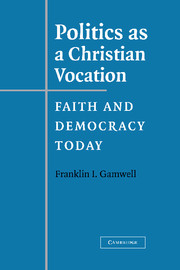Book contents
- Frontmatter
- Contents
- Preface
- Politics as a Christian Vocation
- Introduction: The Present Purpose
- 1 Render to Caesar
- 2 Government by the People
- 3 Faith and the Way of Reason
- 4 Justice in the Community of Love
- 5 Religious Decisions at Stake
- 6 Political Deliberations
- Appendix: On the Humanistic Commitment
- Works Cited
- Index
3 - Faith and the Way of Reason
Published online by Cambridge University Press: 18 February 2010
- Frontmatter
- Contents
- Preface
- Politics as a Christian Vocation
- Introduction: The Present Purpose
- 1 Render to Caesar
- 2 Government by the People
- 3 Faith and the Way of Reason
- 4 Justice in the Community of Love
- 5 Religious Decisions at Stake
- 6 Political Deliberations
- Appendix: On the Humanistic Commitment
- Works Cited
- Index
Summary
Does Christian faith affirm the principles of democratic politics? In the contemporary United States, a relatively few Christians might answer “no,” perhaps because they believe that Christian faith prescribes a withdrawal from the concerns of this world or, more specifically, from politics. But most, I expect, would readily answer “yes.” Thereby, they would stand with most Christians in United States history, for whom their faith has supplied the deepest reason to uphold the democratic ideals of this republic. In recent history, no American gave more eloquent or profound expression to the harmony between God's purpose and those ideals than did Martin Luther King, Jr., through whose incisive cadences the movement for equality in the mid-twentieth century appealed simultaneously to the divine calling and the American creed. But however easily most Christians may embrace democracy, their doing so with integrity depends on accepting a relation between faith and reason they may not so readily affirm. The argument here for politics as a common Christian vocation also depends on that relation. This calling, I seek to show, belongs to Christians generally because Christian faith prescribes democracy. Hence, we must now ask whether Christian faith is consistent with the way of reason.
DEFINING THE QUESTION
Government by the people, the previous chapter concluded, gives political form to the humanistic commitment, so that the former cannot be consistently endorsed without the latter. Democracy requires that religious convictions can be validated or invalidated in the argumentative practice of “we the people.”
- Type
- Chapter
- Information
- Politics as a Christian VocationFaith and Democracy Today, pp. 56 - 78Publisher: Cambridge University PressPrint publication year: 2004



